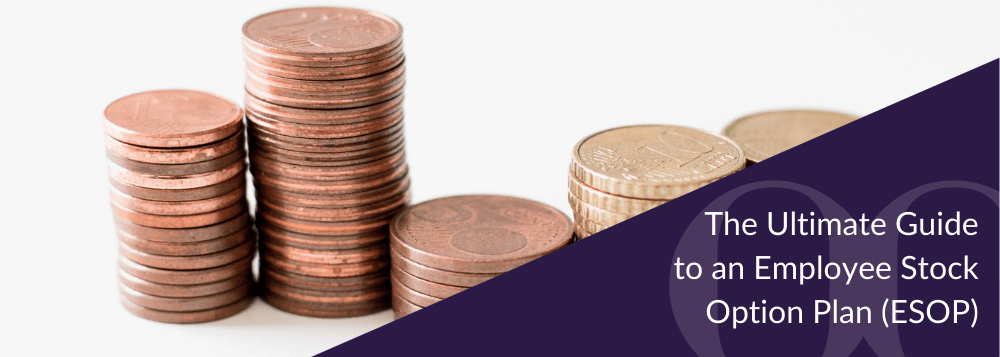Introduction to Employee Stock Option Plan (ESOP)
We have all heard of an employee stock option plan or employee stock ownership plan (ESOP), but how does this scheme work in practice, and how do you determine if it is suitable for your company?
If you are considering implementing an ESOP for your organisation, you may have questions about how it works, the benefits, and the factors to consider. In this article, we will answer these questions and provide the basic guidelines of an ESOP plan, including how it works and how to set up an ESOP, so you can see if it might be a viable solution for your business. We will also show you how BoardRoom can help you with your ESOP needs in Singapore.
What is an Employee Stock Option Plan (ESOP)?
An Employee Stock Option Plan (ESOP) is one form of remuneration given to employees by means of retaining them or rewarding them based on their performance. They are usually offered in the form of company shares, which provide the employee with ownership rights as a shareholder of the company. As part of an ESOP scheme, the employee can acquire the shares at a predetermined price, or what we call an exercise price.
ESOPs are designed to align the interests of employees and shareholders, as well as to attract and retain talent. These employee share option schemes are becoming more popular in Singapore, especially among startups as well as Small and Medium Enterprises (SMEs) across multiple industries.
The Lifecycle of an ESOP Scheme
The lifecycle of an ESOP scheme can be broken down into a few events: Offer, Vesting, Exercise, Leaver, and Lapse. An employee will first accept an ESOP option offering, whereby a fixed number of options will be allotted to them. After a certain timeframe, a proportion of the allotted options will vest, meaning the employee can now exercise these options.
To exercise these vested options, the employee will pay the total exercise cost (number of options x exercise price) and receive actual company shares afterward. If they do not exercise these vested options after the expiry date, they will lapse or expire, meaning the participant can no longer exercise these options moving forward. If the employee leaves the company halfway through the ESOP’s lifecycle, in some cases, all their vested and unvested options will lapse completely. This will depend on the particular company’s employee stock option plan rules.
Why Would Companies Adopt an Employee Stock Option Plan (ESOP)?
Companies who want to grow their business whilst mitigating costs usually adopt an ESOP plan. This is driven by two primary reasons:
- Employee performance is directly linked to company performance and, thus, employee remuneration. Employees can only benefit from their ESOP when the company’s market price is above the exercise price, which means that a company needs to grow to spur the market price of the share.
- There is no heavy upfront cost to the company. Cost to the company, in this case, is only incurred during the exercise of the Furthermore, the employee will cover the exercise cost, so it’s a win-win for companies looking to grow whilst mitigating costs.
How Do Employees Benefit From an ESOP?
When employees are rewarded with shares of the company, they essentially become part owners of the company. In turn, this directly correlates with employee performance and investment in business performance. The employee’s actions, decisions, and work output are all focused on the greater good of the firm as this is mutually aligned with their own rewards.
What are the Advantages of an ESOP?
An ESOP is more than just a compensation scheme for employees; it is also a way to inspire them. But more than that, this scheme also brings a magnitude of advantages to the organisation.
Below are some of the notable reasons why an ESOP can be a mutually beneficial scheme for everyone.
For the company
- Attract and retain talent: An ESOP can help the company recruit and retain high-performing employees, especially in a competitive job market like Singapore. It can also reduce employee turnover and increase employee loyalty, as employees are more likely to stay with the company until their options vest and appreciate in value.
- Motivate and align employees: Employees are incentivised to work harder and smarter with an ESOP, as they have a stake in the company’s success. The scheme can also align the interests of employees and shareholders, considering employees share the same goal of increasing the company’s value.
- Conserve cash and tax benefits: The company can conserve cash with an ESOP, as it does not require any upfront payment to the employees. The options are not taxable until they are exercised by the employees, which can also provide tax benefits to the company.
For the employees
- Financial rewards: Employees can enjoy financial rewards from an ESOP as they can profit from the difference between the exercise price and the sale price of the shares. Depending on the company’s performance and dividend policy, an ESOP can also provide dividends and capital gains to the employees.
- Sense of ownership and recognition: An ESOP can create a sense of ownership and recognition for the employees, as they own a part of the company. The scheme can also foster a sense of fairness and appreciation, with employees being rewarded for their contributions and efforts.
Employee Stock Option Plan (ESOP) Illustration
To provide an illustration, say on 1st Sept 2019, Mei San has accepted her company’s ESOP 2019 Offer for 900 options with an exercise price of S$ 1 per share. These options will vest annually across 3 years in equal proportions. The expiry date of the options will be 10 years from the offer date, which will be 1st Sept 2029.
| ESOP 2019 Offer | Vesting Dates | Options to be vested | Unvested Options | Vested Options |
| Allotment Day | 1st Sept 2019 | 0 | 900 | 0 |
| Vesting 1 | 1st Sept 2020 | 300 | 600 | 300 |
| Vesting 2 | 1st Sept 2021 | 300 | 300 | 600 |
| Vesting 3 | 1st Sept 2022 | 300 | 0 | 900 |
A few points to take note of in the table above:
- On 1st Sept 2019, 900 options are allotted but remain unvested, which means Mei San cannot exercise these options
- On 1st Sept 2020, 300 have vested meaning Mei San can exercise them by paying the exercise cost of S$ 300 (300 Options x S$ 1) to acquire 300 shares of the company
- After 1st Sept 2029, all vested options will lapse, if Mei San has not exercised them prior to this date she will not be able to do so, they have effectively expired
- If Mei San leaves the company to join another firm halfway through, all vested and unvested options shall expire upon notice of resignation
Other variables to consider:
The illustration above is only one of many examples. Common variables that change include:
- Inclusion of a performance matrix, where the number of options to be vested will depend on the employee’s work performance
- More frequent vesting (e.g. Bi-annual), to entice employees with “more” reward
- Broad-based share option plan where all employees are offered the options plan to encourage ownership thinking across the company
- Some companies may allow retirees to continue to hold on to their vested options until the expiry date
Depending on your company’s requirements, you will need to understand the implications of these variables, and whether they can help achieve your ultimate objective of your employee stock option plan (ESOP).
What are Factors to Consider Before Implementing an ESOP?
ESOPs can be a powerful way to attract, retain, and motivate employees, but they also come with challenges and risks that must be carefully weighed before implementation. Some of the factors to consider are:
Complexity and Cost
An ESOP is not a simple scheme to set up and manage. It involves a lot of professional advice and expertise on legal, accounting, and valuation matters. It also requires compliance with various rules and regulations and correctly reporting the employees’ ESOP income. The are initial and ongoing costs associated with an ESOP, so the benefits of an ESOP should be evaluated against the expenses and efforts involved.
Equity Dilution and Control
Offering an ESOP means giving away some of the ownership and control of the company to the employees. This setup may have consequences for the existing shareholders, who may see their share and voting power diluted. It may also affect the company’s future plans, such as raising capital, attracting investors, or merging or selling the company. The amount of equity that is comfortable to share with the employees and the rights and restrictions applied to the employee shareholders should be predetermined.
Alignment and Communication
An ESOP can be a great way to align the interests and goals of the employees and the company, but only if the participants understand and value their share options. Management must communicate the purpose, terms, and performance of the ESOP clearly and consistently to their employees. Ultimately, a culture of ownership and engagement among the employees should be created, and they should be rewarded for their contributions to the company’s growth and success.
What are the Tax Implications of an ESOP in Singapore?
Understanding the taxation of ESOPs in Singapore is crucial for both local and foreign employees. In Singapore, employees typically pay taxes on gains from their ESOPs as per the applicable tax slab for individuals, following the guidelines set by the Inland Revenue Authority of Singapore (IRAS).
For Singaporean employees, the taxation process is straightforward—gains from squaring ESOP positions are treated as regular income and taxed accordingly.
Deemed Exercise Rule for Foreign Employees
For foreign employees in Singapore who are granted ESOPs, the taxation process involves a concept known as the “deemed exercise” rule. According to this rule, employees are considered to have derived gains from unexercised or restricted ESOPs when they cease to work in the country and with the employer who granted the options.
This rule applies to ESOPs and Employee Stock Ownership (ESOW) plans issued on or after 1st Jan 2003.
The notional gain is calculated based on:
- Open market price of the shares
Determined on either the grant date of ESOPs or ESOWs or one month before the date when an employee ceases employment, whichever occurs later.
- Exercise price of the shares
This is determined based on:
- The exercise price of the shares under the unexercised/restricted ESOP; or
- The price paid or payable for the shares acquired under the ESOW with vesting/moratorium imposed.
The difference between the open market price and exercise price determines the deemed taxable amount.
Exception for Singapore Residents with Overseas Employment
It’s important to note that if a Singapore resident is granted ESOPs in respect of overseas employment, the gains are not considered income generated in Singapore. Consequently, they are not subject to taxes in Singapore.
Simplify Your ESOP Journey with BoardRoom
ESOP is a powerful tool for rewarding and motivating your employees, as well as aligning their interests with your company’s goals. However, implementing an ESOP can be complex and challenging, requiring careful planning, compliance, and communication.
If you are looking for a professional and reliable partner to help you design, implement, and manage your ESOP, consider BoardRoom as your ESOP provider. BoardRoom is a leading provider of ESOP services in Singapore and across Asia-Pacific, with over 50 years of experience and expertise.
We offer a comprehensive and customised ESOP platform that can help you streamline your ESOP processes, stay compliant with local regulatory requirements, and ensure employee engagement. Our ESOP service also includes a dedicated team of professionals who can assist you with your ESOP needs, from planning and implementation to administration and support.
So, whether you are a listed or unlisted entity, BoardRoom can help you create and administer an ESOP that suits your business objectives. Learn how to set up an ESOP from start to finish, and contact us today!
Looking for More information on Employee Share Plans in Singapore?
Check out the following Boardroom articles/resources to find out more on ESOP implementation or employee share plan services.
- Why you should be considering an Employee Share Plan amidst Covid-19
- What is an Employee Share Plan? (ESAS vs ESPP)
- Top 5 key benefits of having an Employee Share Option Plan (ESOP)
- Top 5 challenges with Employee Share Option Plan (ESOP) Implementation and how to conquer them
Or you can also learn more about our Employee Stock Option Plan (ESOP) services here.




